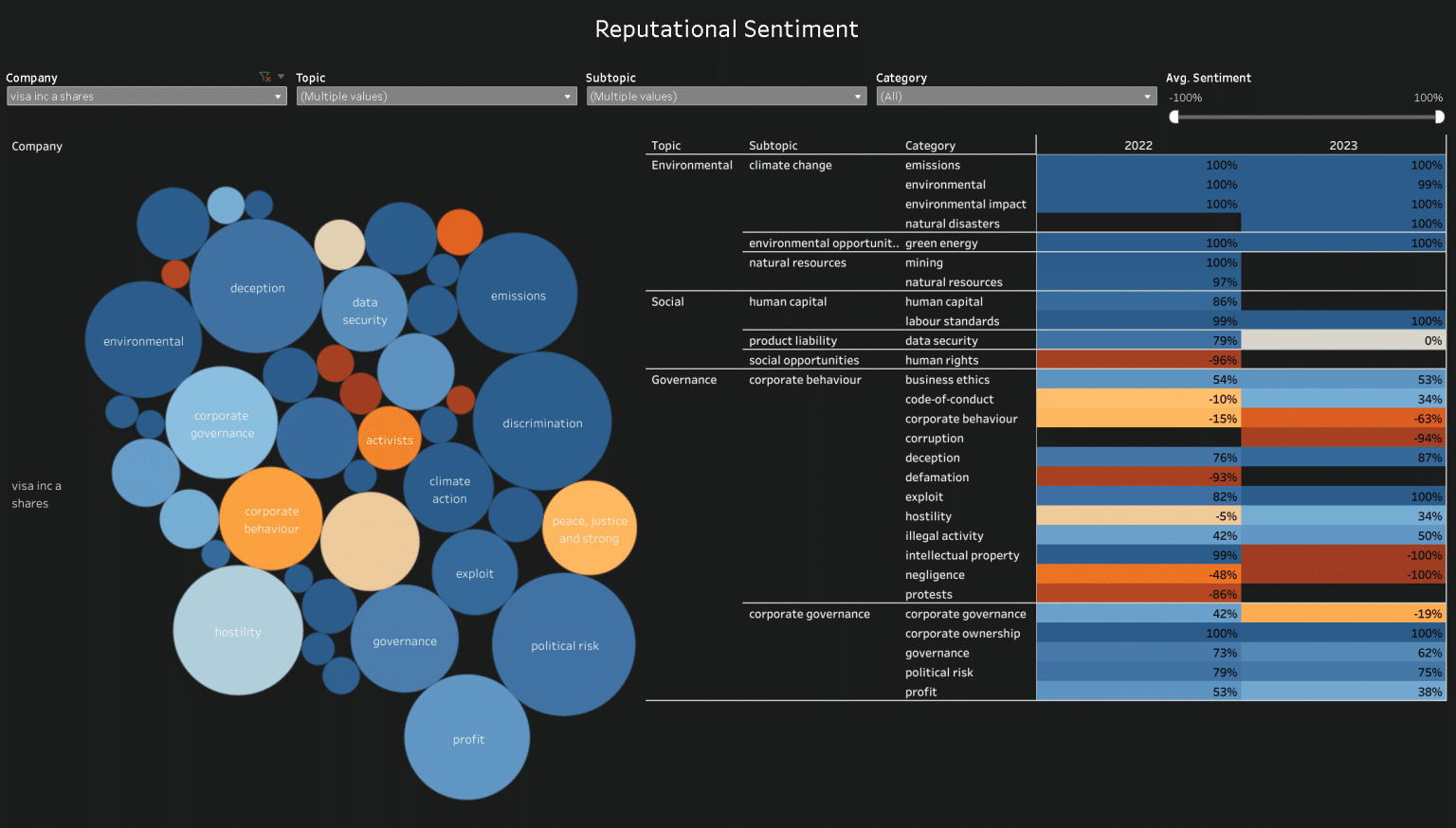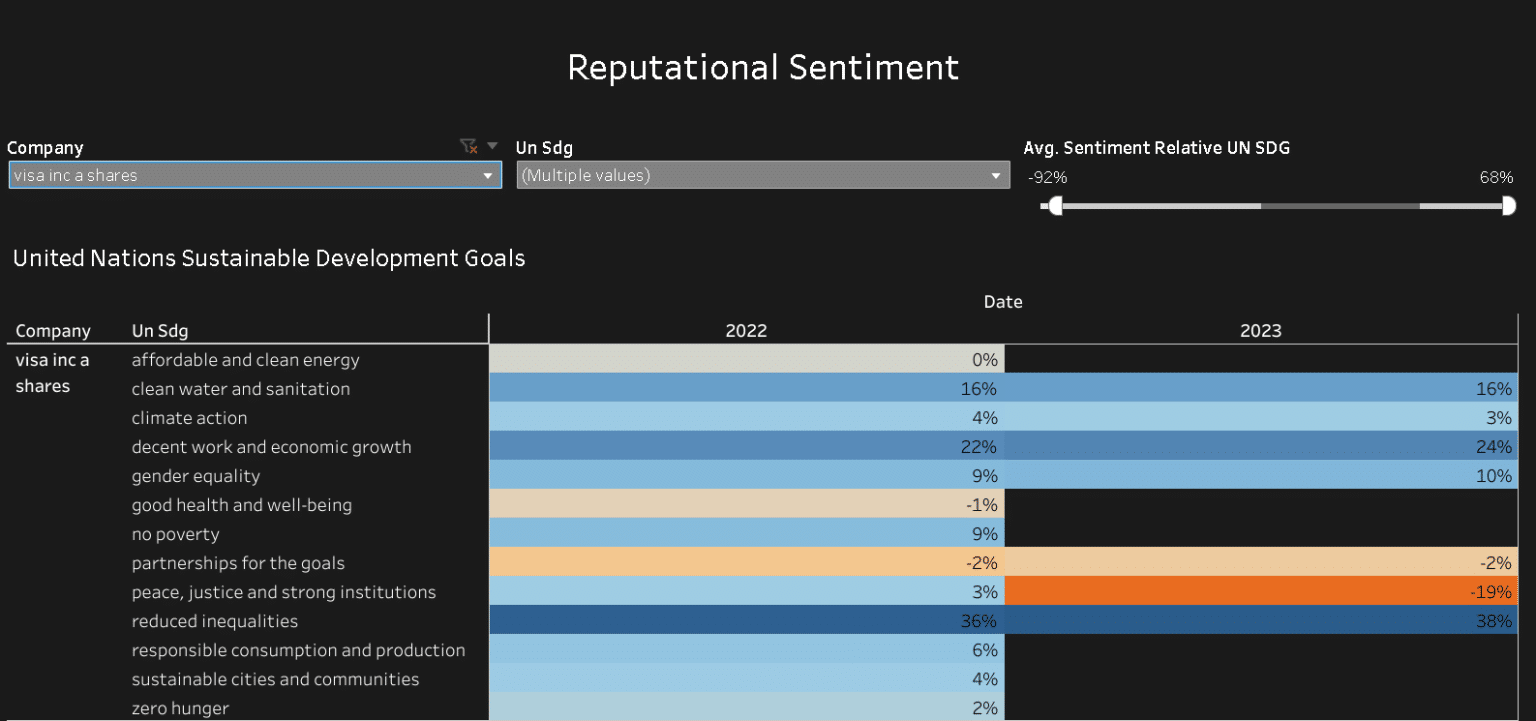Visa, the global leader in digital payments, has been at the forefront of sustainability and corporate responsibility initiatives. As the world becomes more conscious of the environmental, social, and governance (ESG) aspects of businesses, Visa has recognized the importance of measuring and communicating its sustainability efforts. In this article, we will delve into the Visa ESG score according to our data and understand how it reflects the company’s commitment to sustainable practices.
Overview of Visa’s Sustainability and Corporate Responsibility Initiatives
Visa has a strong commitment to sustainability and corporate responsibility. The company recognizes that its success is intertwined with the well-being of the communities it serves and the planet as a whole. Visa’s sustainability initiatives are focused on three main areas: environmental impact, social responsibility, and ethical governance.
In terms of environmental impact, Visa has set ambitious goals to reduce its carbon footprint and increase renewable energy usage. The company has implemented energy-efficient technologies, reduced water consumption, and invested in renewable energy projects. Visa also aims to support sustainable supply chains and promote responsible sourcing practices.
Visa’s social responsibility initiatives are centered around financial inclusion and empowering underserved communities. The company has launched programs to promote financial literacy, support small and micro-businesses, and provide access to digital payments in areas with limited banking infrastructure. Visa also advocates for diversity and inclusion within its workforce and partners with organizations that promote social equality.
Ethical governance is a fundamental aspect of Visa’s corporate responsibility. The company has established strong ethical standards, a robust compliance program, and a commitment to transparency. Visa’s board of directors oversees the company’s sustainability initiatives and ensures that they align with its long-term strategy.
Visa ESG Score and its Significance
At time of writing, our Visa ESG score comes in at 98 for environmental, 67 for governance and 92 for social which is strong across the board. Visa’s ESG score is an important metric that provides a snapshot of the company’s sustainability and corporate responsibility performance. It allows investors and stakeholders to assess Visa’s commitment to ESG factors and make informed decisions about their engagement with the company. A high ESG score indicates that Visa is effectively managing its environmental impact, social responsibility, and governance practices.
Moreover, this strong ESG score enhances Visa’s reputation and attract socially responsible investors. As the demand for sustainable investments grows, companies with high ESG scores are more likely to receive capital allocation and support. By prioritizing ESG factors, Visa demonstrates its long-term vision and resilience in the face of emerging sustainability challenges.

Visa ESG Score: How it is Calculated
Our Visa ESG score is calculated using a rigorous methodology that takes into account various factors and indicators. The company considers both quantitative and qualitative data to assess its performance across the environmental, social, and governance dimensions.
In the environmental dimension, Visa evaluates its greenhouse gas emissions, water usage, waste management practices, and energy efficiency. The company also assesses its efforts in promoting sustainable supply chains and reducing the environmental impact of its operations.
On the social front, Visa measures its contributions to financial inclusion, customer satisfaction, employee engagement, and diversity and inclusion. The company also considers its impact on the communities it operates in and its efforts to address social issues such as poverty and inequality.
In terms of governance, Visa evaluates its board structure, executive compensation practices, risk management, and ethical standards. The company also looks at its policies and procedures for transparency, anti-corruption, and stakeholder engagement.
Visa ESG Score: Key Factors Considered
Visa’s ESG score is influenced by several key factors that reflect the company’s commitment to sustainability and corporate responsibility. These factors include:
Climate Change Mitigation: Visa’s efforts to reduce its carbon footprint, increase renewable energy usage, and support initiatives that mitigate climate change.
Financial Inclusion: Visa’s initiatives to promote financial literacy, support underserved communities, and provide access to digital payments in areas with limited banking infrastructure.
Diversity and Inclusion: Visa’s commitment to fostering diversity and inclusion within its workforce and ensuring equal opportunities for all employees.
Ethical Governance: Visa’s adherence to ethical standards, transparency, and robust compliance practices that promote responsible business conduct.
Responsible Sourcing: Visa’s commitment to responsible sourcing practices, including ensuring the ethical treatment of workers and minimizing environmental impact throughout its supply chain.
Visa’s Performance in Sustainability and Corporate Responsibility
Visa has consistently demonstrated strong performance in sustainability and corporate responsibility. The company’s ESG score reflects its commitment to environmental stewardship, social impact, and ethical governance. Visa has set ambitious goals to reduce its carbon footprint, increase renewable energy usage, and promote financial inclusion.
In terms of environmental impact, Visa has made significant progress in reducing its greenhouse gas emissions and water consumption. The company has also invested in renewable energy projects and implemented energy-efficient technologies in its operations. Additionally, Visa has been actively working towards sustainable supply chains by promoting responsible sourcing practices and minimizing waste.
On the social front, Visa has been a champion of financial inclusion. The company has launched initiatives to promote financial literacy, support small businesses, and provide access to digital payments in underserved communities. Visa’s commitment to diversity and inclusion is evident through its efforts to create an inclusive workplace and ensure equal opportunities for all employees.
In terms of governance, Visa has established strong ethical standards and a robust compliance program. The company’s board of directors provides oversight and guidance on sustainability initiatives, ensuring that they align with Visa’s long-term strategy. Visa also maintains transparency by regularly reporting on its ESG performance and engaging with stakeholders.


Visa ESG Score: Impact on Investors and Stakeholders
Visa’s ESG score has a significant impact on investors and stakeholders. For investors, the ESG score provides valuable insights into Visa’s sustainability practices and long-term viability. By considering ESG factors, investors can assess the risks and opportunities associated with their investment in Visa. A high ESG score indicates that Visa is well-positioned to navigate sustainability challenges and create long-term value.
Stakeholders, including customers, employees, and communities, also benefit from Visa’s strong ESG score. They can have confidence in Visa’s commitment to social responsibility, environmental stewardship, and ethical governance. A high ESG score enhances Visa’s reputation and strengthens its relationships with stakeholders, leading to increased trust and loyalty.
Visa ESG Score Peer Comparison
Visa faces competition from several notable players in the financial services and payment industry. How does the Visa ESG score compare to those of their competitors? Find out below:
– Discover Financial Services ESG score
Visa ESG Score: The Future and the Role of Sustainability
Visa recognizes that sustainability is not a static concept but an ongoing journey. The company is committed to continuously improving its ESG score and addressing emerging sustainability challenges. Visa’s sustainability strategy is aligned with the United Nations Sustainable Development Goals (SDGs) and focuses on areas where the company can make the most significant impact.
In the future, Visa’s ESG score is expected to evolve to reflect changing stakeholder expectations and industry standards. The company will continue to integrate sustainability into its business practices and collaborate with partners to drive positive change. Visa’s ESG score will serve as a benchmark for its progress towards a more sustainable and responsible future.
Visa’s Commitment to Sustainability and Corporate Responsibility
The Visa ESG score is a testament to the company’s commitment to sustainability and corporate responsibility. By prioritizing environmental, social, and governance factors, Visa is creating long-term value for its stakeholders and contributing to a more sustainable world. The company’s strong performance in sustainability and corporate responsibility is reflected in its ESG score, which serves as a benchmark for its commitment to sustainable practices.
As Visa continues to navigate the evolving landscape of sustainability, its ESG score will play a crucial role in communicating its progress and engaging with investors and stakeholders. By maintaining a high ESG score, Visa can attract socially responsible investors, enhance its reputation, and drive positive change. Visa’s dedication to sustainability and corporate responsibility sets an example for other companies in the financial industry and beyond, highlighting the importance of ESG in creating a sustainable future.
Find Out More
Unlock deeper insights into Visa’s ESG performance and its competitive standing in the financial landscape by requesting more granular data. As investors and stakeholders, your understanding of Visa’s ESG score is pivotal for informed decision-making. Fill in the form below to request more data.
Get In Touch
